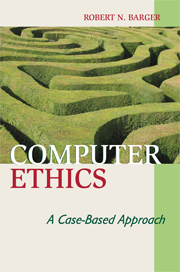Book contents
- Frontmatter
- Contents
- Preface
- Acknowledgments
- 1 Introduction
- 2 The Computer as a Humanizing Agent
- 3 Philosophic Belief Systems
- 4 A Philosophic Inventory
- 5 The Possibility of a Unifying Ethical Theory
- 6 The Ethical Decision-Making Process
- 7 Psychology and Computer Ethics
- 8 The Computing Field as a Profession
- 9 Computer-Related Codes of Ethics
- 10 Computer Ethics and International Development
- 11 Robotics and Ethics
- 12 Theft and Piracy Concerns
- 13 Cases Concerning Theft and Piracy
- 14 Privacy Concerns
- 15 Cases Concerning Privacy
- 16 Power Concerns
- 17 Cases Concerning Power
- 18 A Miscellaneous Collection of Cases
- 19 Parasitic Computing Case
- Appendix: Topics for Presentations, Discussions, and Papers
- Notes
- Selected Bibliography
- Index
13 - Cases Concerning Theft and Piracy
Published online by Cambridge University Press: 05 June 2012
- Frontmatter
- Contents
- Preface
- Acknowledgments
- 1 Introduction
- 2 The Computer as a Humanizing Agent
- 3 Philosophic Belief Systems
- 4 A Philosophic Inventory
- 5 The Possibility of a Unifying Ethical Theory
- 6 The Ethical Decision-Making Process
- 7 Psychology and Computer Ethics
- 8 The Computing Field as a Profession
- 9 Computer-Related Codes of Ethics
- 10 Computer Ethics and International Development
- 11 Robotics and Ethics
- 12 Theft and Piracy Concerns
- 13 Cases Concerning Theft and Piracy
- 14 Privacy Concerns
- 15 Cases Concerning Privacy
- 16 Power Concerns
- 17 Cases Concerning Power
- 18 A Miscellaneous Collection of Cases
- 19 Parasitic Computing Case
- Appendix: Topics for Presentations, Discussions, and Papers
- Notes
- Selected Bibliography
- Index
Summary
In this chapter a number of cases will be presented that involve forms of piracy. By piracy is meant the taking of something, or the attempt to take something, which a person is not entitled to take.
Internet Fraud Case
An e-mail message with no “Subject” line received on January 19, 1999, by Robert Newton Barger from a person using a fictitious name.
ATTN: ROBERT
DATE: January 19, 1999
CC: FRIENDS CLUB
EXTREMELY URGENT AND HIGHLY CONFIDENTIAL
I am [fictitious name] the President of ‘FRIENDS CLUB,’ a charity organization. The club inherited and was disbursed the heavy fortune through revenue allocation from the Funds and Properties Inheritance Board by the Federal Government of Zaire Central Africa.
I got your contact as a reliable, competent and trustworthy person that has a good name. The friends club was disbursed on Friday, January 15, 1999 at 10.35am by the financial controller of the Funds and Properties Inheritance Board, Dr K. S. Chaka, the sum of One Hundred and Thirty One Million USD ($131,000,000.00) to organise charity, promote scholarship programmes and aid the less privileged. This fund is an inheritance contained in the Federal Revenue Allocation for 1999 to charity.
The friends club pledged to ascertain a programme of excellence ever lasting and wishes to invest in a steady lucrative business in Europe or America to achieve its goal. It is my duty to safeguard, persist, and ensure a successful programme for the club. We have started by flying the funds through a security company as trustee to Abidjan, Ivory Coast, a free and safe African country practising [sic] first class democracy to ensure the safety of the funds from theft and also avoid new generation banking fraud affecting the world banking system today which is why you have been contacted.
- Type
- Chapter
- Information
- Computer EthicsA Case-based Approach, pp. 168 - 176Publisher: Cambridge University PressPrint publication year: 2008



